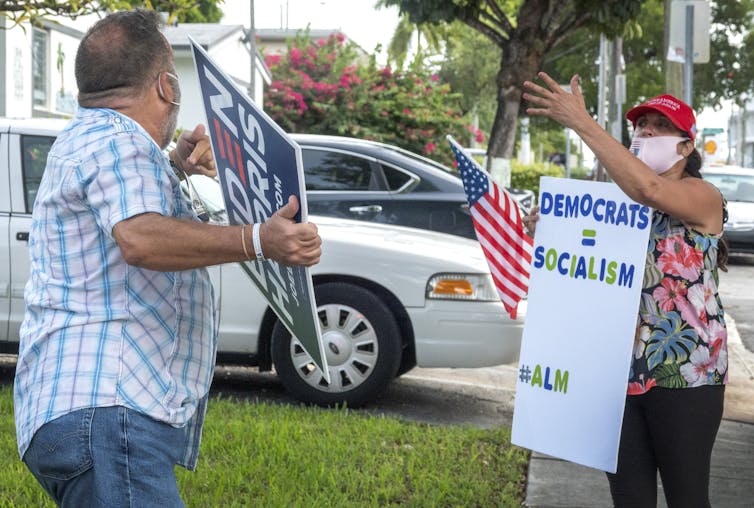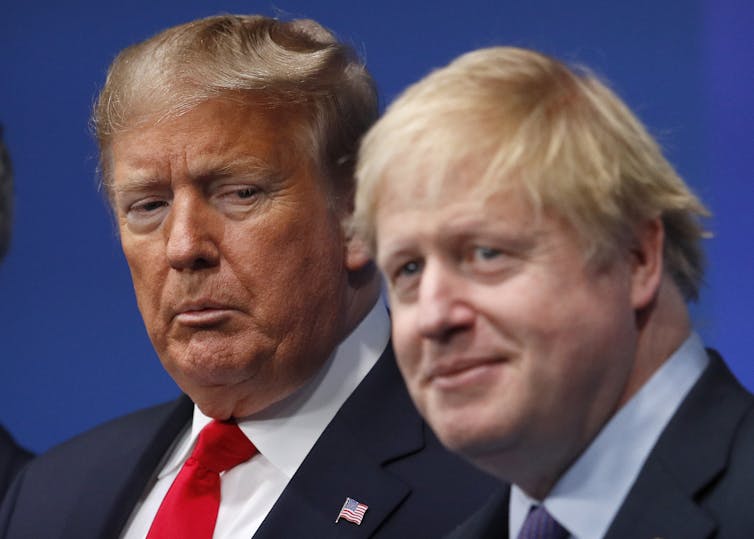what is meant by a “horse race narrative,†as it relates to media coverage of elections?
The 2020 United states of america presidential election campaign is moving rapidly and the news media are valiantly struggling to keep abreast of what's happening. Day in, day out in that location'due south a relentless source of material to study. Information technology's difficult enough for journalists, permit alone the people they are striving to keep informed ahead of polling day on November 3.
Then, only in the past calendar week, there were reports that the president, Donald Trump, has been hinting that he may not acquiesce to a shine transition of power if he loses the vote. Then came allegations nigh Trump's tax avoidance, followed by his claims that Joe Biden was taking performance-enhancing substances ahead of the first televised debate.
And what a debate it was, anarchic and devoid of serious word. This was followed by the news that the president and first lady had tested positive for COVID-19 and that – on debate night – their wider family refused to clothing confront masks when requested to do so.
Then, of class, we've had the saga of Trump being hospitalised, which once more has been fraught with controversy. Conspiracy theorists, of which at that place appears to exist an ever-growing number, are even suggesting information technology has all been a ploy to regenerate a flagging campaign.
Where are the issues?
A focus on personalities, campaign events, mishaps and stance polls and are highly newsworthy – just meaningful coverage of key bug, and the policies being adult by the candidates is marginalised.

For anyone who has analysed the coverage of the past few elections, this is unsurprising. The book Reporting Elections: Rethinking the Logic of Campaign Coverage, which I co-authored in 2018 with Stephen Absorber of Cardiff University, quotes information nerveless by US news analyst Andrew Tyndall during the 2016 US entrada showing that two weeks before polling day, result coverage had been "virtually not-existent" on the three main TV news networks CBS, NBC and ABC.
Indeed, their combined coverage of bug amounted to just 32 minutes and seemingly battled in vain with the non-policy focus on aspects such as Hillary Clinton's emails and Donald Trump's personal life.
Intuitively – particularly in the middle of a global news story such equally COVID-19 – issue coverage in 2020 is likely to be shallower still. But while the policy versus process news imbalance is more than extreme in the The states, it is a wider phenomenon beyond most democracies.
While researching Reporting Elections, we found that Television receiver viewers are likely to see more than policy coverage in countries with public service broadcasters. But even and so, the overwhelming conclusion from looking at dozens of studies examining the nature of election coverage is that "who is going to win?" is a more compelling question than "what will they actually exercise when they win?"
Who's upward, who'southward down?
There are some logical reasons for the emphasis on process over policy. First, as political commentator Isabel Oakeshott indicates, political news has some synergy with news about sport – surely a national obsession everywhere – and its fascination with "who's up, who's down, who's on the benches" and "who's in trouble for a foul".
Next, while there are no such regulatory requirements in the US mandating that broadcast journalists must strive for impartiality – as in the UK – reporting opinion poll data might be a safer selection than dissecting policy proposals that might leave broadcasters open to accusations that they've been besides hard on one party, or as well soft on another.
Further, more trivial or salacious entrada details feed contemporary 24/7 news cycles, and 1 perception is that they trigger stories and angles without the need for the deep, forensic unpicking of any policy proposals.
Just this isn't simply nigh whatever journalistic failure. Reporting Elections reveals frustrations felt past Boob tube editors and reporters that politicians often don't wish to appoint with policy and are invariably happier talking almost, for example, opinion polls – switching seamlessly between: "await how well we're doing" if they are winning, and: "these polls don't hateful anything" if they are losing. Meanwhile, the bad-mannered questions about policy detail are avoided.
To emphasise this betoken, at one stage in the 2016 entrada, Donald Trump's campaign identified seven policy proposals taking upwardly around 9,000 words on his website. Meanwhile, Hillary Clinton's website discussed over seven times as many bug and spent more than 12 times every bit many words describing them. But across the iii primary U.s.a. networks, Trump still attracted twice the volume of coverage that Clinton did.
Personality politics
This might be at to the lowest degree partly explained by the reality that some candidates – past which in this case we mean Trump rather than Joe Biden – are fundamentally newsworthy. Even when his actual activities and controversies are in recess, the president creates his own virtual news agenda via Twitter.

The British prime government minister, Boris Johnson, might be said to sometimes relish a like – some would say accident-prone – beingness. But both were the winners of their nearly recent electoral contests. In the 2014 European elections in the UK, the similarly non-conventional and controversial Nigel Farage – and thus the things he wanted to talk about – dominated Television receiver coverage before his political party did the aforementioned at the polls.
Then, if politicians, editors and journalists adopt coverage near polls, gaffes, controversies and incidents, coverage of policy bug inevitably makes way. Such coverage might fifty-fifty help the politicians it relates to. But what interests the public is not necessarily in the public involvement – and election coverage might not be helping citizens make sense of the policies that will impact their lives afterwards polling day.
The authors of this article discuss this and other Us election problems in a weekly podcast which can exist found here (Apple) or hither (Spotify).
Baca juga: Afterwards a fell campaign, a moment of transcendence for Hillary Clinton
Source: https://theconversation.com/us-election-horse-race-reporting-is-media-gold-but-democratic-poison-147480
Post a Comment for "what is meant by a “horse race narrative,†as it relates to media coverage of elections?"